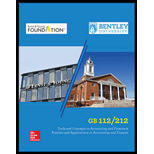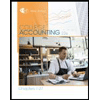
GB 112/212 MANAGERIAL ACC. W/ACCESS >C<
17th Edition
ISBN: 9781260218831
Author: Libby
Publisher: MCG CUSTOM
expand_more
expand_more
format_list_bulleted
Concept explainers
Textbook Question
Chapter 3, Problem 11Q
Complete the following matrix by entering either increase or decrease in each cell:
| Item | Debit | Credit |
| Revenues | ||
| Losses | ||
| Gains | ||
| Expenses |
Expert Solution & Answer
Want to see the full answer?
Check out a sample textbook solution
Students have asked these similar questions
I am searching for the accurate solution to this general accounting problem with the right approach.
Please provide the accurate answer to this general accounting problem using valid techniques.
Please show me the correct approach to solving this financial accounting question with proper techniques.
Chapter 3 Solutions
GB 112/212 MANAGERIAL ACC. W/ACCESS >C<
Ch. 3 - Prob. 1QCh. 3 - Prob. 2QCh. 3 - Write the income statement equation and define...Ch. 3 - Explain the difference between a. Revenues and...Ch. 3 - Define accrual accounting and contrast it with...Ch. 3 - Prob. 6QCh. 3 - Explain the expense recognition principle.Ch. 3 - Explain why stockholders equity is increased by...Ch. 3 - Explain why revenues are recorded as credits and...Ch. 3 - Complete the following matrix by entering either...
Ch. 3 - Complete the following matrix by entering either...Ch. 3 - Prob. 12QCh. 3 - State the equation for the net profit margin ratio...Ch. 3 - Which of the following is not a specific account...Ch. 3 - Which of the following is not one of the criteria...Ch. 3 - The expense recognition principle controls a....Ch. 3 - Prob. 4MCQCh. 3 - Prob. 5MCQCh. 3 - Prob. 6MCQCh. 3 - Prob. 7MCQCh. 3 - Prob. 8MCQCh. 3 - Prob. 9MCQCh. 3 - Prob. 10MCQCh. 3 - Prob. 3.1MECh. 3 - Reporting Cash Basis versus Accrual Basis Income...Ch. 3 - Identifying Revenues The following transactions...Ch. 3 - Identifying Expenses The following transactions...Ch. 3 - Prob. 3.5MECh. 3 - Prob. 3.6MECh. 3 - Determining the Financial Statement Effects of...Ch. 3 - Prob. 3.8MECh. 3 - Prob. 3.9MECh. 3 - Identifying the Operating Activities in a...Ch. 3 - Prob. 3.11MECh. 3 - Prob. 3.1ECh. 3 - Reporting Cash Basis versus Accrual Basis Income...Ch. 3 - Identifying Revenues Revenues are normally...Ch. 3 - Identifying Expenses Revenues are normally...Ch. 3 - Prob. 3.5ECh. 3 - Determining Financial Statement Effects of Various...Ch. 3 - Recording Journal Entries Sysco, formed in 1969,...Ch. 3 - Prob. 3.8ECh. 3 - Prob. 3.9ECh. 3 - Analyzing the Effects of Transactions in...Ch. 3 - Preparing an Income Statement Refer to E3-10....Ch. 3 - Prob. 3.12ECh. 3 - Analyzing the Effects of Transactions in...Ch. 3 - Prob. 3.14ECh. 3 - Prob. 3.15ECh. 3 - Prob. 3.16ECh. 3 - Prob. 3.17ECh. 3 - Prob. 3.18ECh. 3 - Prob. 3.19ECh. 3 - Prob. 3.20ECh. 3 - Prob. 3.1PCh. 3 - Recording Journal Entries (AP3-2) Ryan Terlecki...Ch. 3 - Prob. 3.3PCh. 3 - Prob. 3.4PCh. 3 - Prob. 3.5PCh. 3 - Prob. 3.6PCh. 3 - Prob. 3.7PCh. 3 - Recording Nonquantitative Journal Entries (P3-1)...Ch. 3 - Prob. 3.2APCh. 3 - Prob. 3.3APCh. 3 - Prob. 3.4APCh. 3 - Prob. 3.5APCh. 3 - Prob. 3.6APCh. 3 - Accounting for Operating Activities in a New...Ch. 3 - Finding Financial Information Refer to the...Ch. 3 - Finding Financial Information Refer to the...Ch. 3 - Comparing Companies within an Industry Refer to...Ch. 3 - Analyzing a Company over Time Refer to the annual...Ch. 3 - Prob. 3.6CPCh. 3 - Evaluating an Ethical Dilemma Mike Lynch is the...
Knowledge Booster
Learn more about
Need a deep-dive on the concept behind this application? Look no further. Learn more about this topic, accounting and related others by exploring similar questions and additional content below.Similar questions
- I need help solving this general accounting question with the proper methodology.arrow_forwardUsing the weighted- average method of process costing , the cost per equivalent unit of direct material is:arrow_forwardI am looking for help with this financial accounting question using proper accounting standards.arrow_forward
- What is the cost of goods manufactured for the period?arrow_forwardCan you explain the process for solving this financial accounting question accurately?arrow_forwardFallon Manufacturing Company measures its activity in terms of machine hours. Last month, the budgeted level of activity was 2,300 machine hours and the actual level of activity was 2,450 machine hours. The cost formula for maintenance expenses is $4.25 per machine hour plus $18,500 per month. The actual maintenance expense was $29,600. Last month, the spending variance for maintenance expenses was _.arrow_forward
- Please explain the solution to this general accounting problem with accurate principles.arrow_forwardI need help finding the correct solution to this financial accounting problem with valid methods.arrow_forwardCan you solve this general accounting problem using appropriate accounting principles?arrow_forward
arrow_back_ios
SEE MORE QUESTIONS
arrow_forward_ios
Recommended textbooks for you
 Auditing: A Risk Based-Approach (MindTap Course L...AccountingISBN:9781337619455Author:Karla M Johnstone, Audrey A. Gramling, Larry E. RittenbergPublisher:Cengage Learning
Auditing: A Risk Based-Approach (MindTap Course L...AccountingISBN:9781337619455Author:Karla M Johnstone, Audrey A. Gramling, Larry E. RittenbergPublisher:Cengage Learning College Accounting, Chapters 1-27 (New in Account...AccountingISBN:9781305666160Author:James A. Heintz, Robert W. ParryPublisher:Cengage LearningPrinciples of Accounting Volume 1AccountingISBN:9781947172685Author:OpenStaxPublisher:OpenStax College
College Accounting, Chapters 1-27 (New in Account...AccountingISBN:9781305666160Author:James A. Heintz, Robert W. ParryPublisher:Cengage LearningPrinciples of Accounting Volume 1AccountingISBN:9781947172685Author:OpenStaxPublisher:OpenStax College Cornerstones of Financial AccountingAccountingISBN:9781337690881Author:Jay Rich, Jeff JonesPublisher:Cengage Learning
Cornerstones of Financial AccountingAccountingISBN:9781337690881Author:Jay Rich, Jeff JonesPublisher:Cengage Learning Financial Accounting: The Impact on Decision Make...AccountingISBN:9781305654174Author:Gary A. Porter, Curtis L. NortonPublisher:Cengage Learning
Financial Accounting: The Impact on Decision Make...AccountingISBN:9781305654174Author:Gary A. Porter, Curtis L. NortonPublisher:Cengage Learning

Auditing: A Risk Based-Approach (MindTap Course L...
Accounting
ISBN:9781337619455
Author:Karla M Johnstone, Audrey A. Gramling, Larry E. Rittenberg
Publisher:Cengage Learning

College Accounting, Chapters 1-27 (New in Account...
Accounting
ISBN:9781305666160
Author:James A. Heintz, Robert W. Parry
Publisher:Cengage Learning

Principles of Accounting Volume 1
Accounting
ISBN:9781947172685
Author:OpenStax
Publisher:OpenStax College

Cornerstones of Financial Accounting
Accounting
ISBN:9781337690881
Author:Jay Rich, Jeff Jones
Publisher:Cengage Learning

Financial Accounting: The Impact on Decision Make...
Accounting
ISBN:9781305654174
Author:Gary A. Porter, Curtis L. Norton
Publisher:Cengage Learning
The accounting cycle; Author: Alanis Business academy;https://www.youtube.com/watch?v=XTspj8CtzPk;License: Standard YouTube License, CC-BY